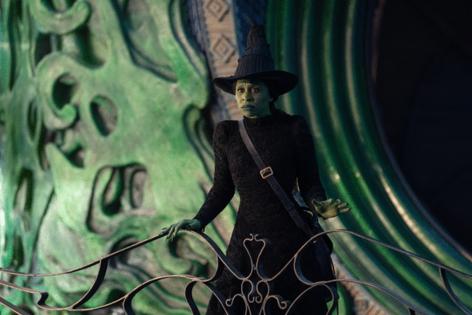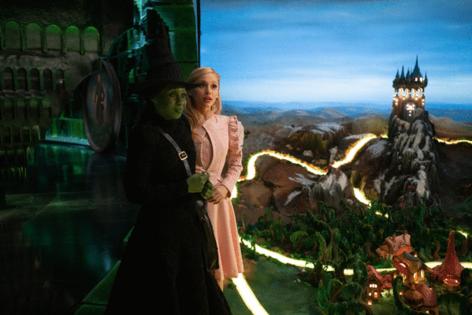All of your questions about the 'Wicked' movie, answered
Published in Entertainment News
[This article contains spoilers for the movie "Wicked."]
"To be continued."
"Wicked" ends with these three words, leaving audiences to wait a year for resolution.
Until then, there's much to discuss about Universal's ambitious adaptation of the blockbuster stage show, especially its more narratively daring moments — likely affecting both devout fan and casual "Wizard of Oz" aficionados. So whether you left the theater crying or confused, The Times is here to share some clarity on "Wicked."
Why is 'Wicked' split into two movies?
While not uncommon for fantasy flicks and sci-fi entries, it's never been done before with the film adaptation of a stage musical. And this one in particular — based on Gregory Maguire's 1995 novel "Wicked: The Life and Times of the Wicked Witch of the West," which draws from Frank L. Baum's 1900 fantasy novel "The Wonderful Wizard of Oz" and the 1939 film adaptation — "comes heaped high with a century's worth of heritage, in the traditions of literature, screen and stage, plus the massive expectations that come with that," wrote Katie Walsh in her review.
After months of detailed discussions between director Jon M. Chu, composer Stephen Schwartz and book writer Winnie Holzman about potentially sacrificing songs or subplots, "it became very clear that you cannot tell this story in one movie, and if you did, you'd have to literally transform it into something very different, and that's not something I was interested in doing," Chu told The Times.
While split at the stage show's intermission point, "these are two movies with integrity, and they can stand on their own," said Holzman. And according to producer Marc Platt, each act — and therefore, each film — has a point of view that's distinct to the witches played by Cynthia Erivo and Ariana Grande.
"'Wicked' is very much about the human experience — having preconceived notions, seeing the world a different way and changing your point of view," he said. "Yes, this is the story of two girls, but the motor of the first film is really Elphaba's journey of how she finds her voice to speak truth to power. And the second film is very much Glinda coming to see the world differently and changing in her way. Once we laid it out emotionally and narratively, and committed to it, things really fell in place."
The movie's running time is as long as the stage show but only tells half the story. What changes were made from stage to screen?
Recent musical adaptations have included rethought subplots or freshly written songs (sometimes resulting in misguided trims). But longtime "Wicked" fans will notice that the movie doesn't drastically shoehorn any part of the narrative. Instead, it thoughtfully elaborates on the stage show, which opened on Broadway in 2003.
New scenes better cement some character dynamics, like when Elphaba and Glinda first meet in their shared dorm room. "When we were first writing the show, we wrote 30 versions of that scene before 'What Is This Feeling?'" said Schwartz. "Ultimately, we just didn't have the time."
The same is true when the two best friends first come face-to-face with the Wonderful Wizard of Oz (Jeff Goldblum). "There's so much more time that he can take to delicately win them over and bring them into his world, and you get to see the girls get really won over by him," said Holzman.
The introduction to Elphaba as a child, shunned by other kids and scorned by her father, was also abandoned in the making of the stage show, said Holzman: "To do that onstage is a whole thing, she'd be painted green for a one-minute-long part! But film is the perfect medium to finally do it."
The movie also features a few slightly sharpened characters — a more independent Nessarose (Marissa Bode), a seemingly more maternal Madame Morrible (Michelle Yeoh) as "the mother Elphaba always wanted and never had," said Platt — and a lot of new jokes, many of which were improvised by the cast. Plus, an extended "One Short Day" section explains the Wizard's magical abilities, complete with cameos from original stars Idina Menzel and Kristin Chenoweth, as well as creators Schwartz and Holzman.
"It felt like we let the story and the characters breathe," said Schwartz, who wrote a new song that didn't make the cut. That discernment is thanks to Chu, said Platt: "Very frequently, Jon stopped us from changing things or turning them into something else. Because of his love for the material and his great sense of purpose and legacy, he protected us against ourselves."
What did that silent 'Dancing Through Life' section mean?
One expanded sequence is "Dancing Through Life" — specifically, the section at the Ozdust Ballroom. Elphaba arrives alone, outfitted in the pointy black hat that Glinda has tricked her into wearing, and gets teased by all her classmates as she has been since arriving at Shiz University. Nevertheless, Elphaba begins to dance, executing every move as a woman boldly and unashamedly herself, even if it means remaining as lonely as ever.
Onstage, these dance moves are played for laughs, but "Cynthia came in and said, 'I'm not a joke,'" Chu recalled of his early discussions with Erivo. "In the stage show, the audience has the same perspective as all the Ozians, but because of all the tools of cinema, we can flip it so the movie is from Elphaba's perspective. Finding that really locked it in for me."
Onscreen, the moment is deeply moving, with the sound of laughter muffled and the camera zooming in on Elphaba's tears. Glinda, already feeling bad about the hat prank and ready to repay Elphaba for putting in a good word about her with the powerful Madame Morrible, joins her on the dance floor, echoing her movements with tears in her eyes as well. With this unspoken apology, the scene marks the beginning of their friendship.
"We're in a massive musical, and Jon has the bravery to take sound out completely," said cinematographer Alice Brooks of the scene. "The heart of the movie is in these very static, still and silent moments, where these two women have nonverbal communication with each other."
It's a moment that means a lot to Chu, who watched the stage show during its pre-Broadway run in San Francisco in 2003, and it's safe to say it left a handprint on his heart. "I remember sitting in that theater and feeling like it was made for me," he said. "Every word speaks to something so much deeper than just a song you hear and know the words to. Making this movie, I wanted people to feel what I felt in that seat."
What happened during that 'Defying Gravity' scene?
The entire film builds up to Elphaba's signature song, which gloriously closes the first act onstage with the newly named "Wicked Witch" flying for the first time. "It doesn't actually plug all the holes that you need, but we're rooting for the whole movie for her to do it," said Chu of the beloved number. "But when we storyboarded it, what we found was, she didn't earn this flight."
Therefore, "Defying Gravity" is presented in sections onscreen. After a fiery, action-packed sequence in which flying monkeys chase after Glinda and Elphaba, the two find themselves at a crossroads: Glinda wants to please Madame Morrible and the renowned Wizard — even if they do want to cast powerful spells to ostracize the talking animals of Oz — while Elphaba would rather flee the scene than align with these lying leaders.
Elphaba asks her best friend to come with her, but Glinda silently decides not to, instead handing her a black cape to stay warm. Though they're splitting up, there's no bitterness between them: "I hope it brings you bliss, I really hope you get it and you don't live to regret it," they sing to each other. "I hope you're happy in the end, I hope you're happy, my friend."
Bewitched broom in hand, Elphaba then tries to fly, but instead starts falling straight toward the ground. "When she jumps out that window, she thinks she's ready, but she's not," explained Chu. "She doesn't know why she's doing it. Is this just because she's angry? Or is it just for vengeance?"
Elphaba then sees the younger version of herself (Karis Musongole) in the Emerald City castle's reflection. "I've known Jon for 25 years, and thematically, there's always a connection with your younger self that he's so passionate about," said Brooks. "He desperately wants to know what your younger self would say to you."
As they're both in freefall, young Elphaba reaches out to the adult witch, who reaches back. "It's that arc of connecting to this person you've always been, and discovering that the power and strength you've been looking for has always been inside of you," said Brooks of the dialogue-free moment.
"She grabs that broomstick, flies up and sings, 'It's me' because she's realized she's doing it to heal herself and save herself," added Chu. Elphaba then delivers the final declaration of the song, not just to Glinda and all the Ozians who are now hunting her down, as done onstage, but also to Madame Morrible and the Wizard, who colluded to deceive her.
So what does the ending mean for the second 'Wicked' movie?
"Part 2" is scheduled for release Nov. 21, 2025, and a yearlong intermission between films is fitting — the second movie, like the second act of the stage show, will probably begin with a time jump. Consider how "Part 1's" last scene checks on the other characters: Fiyero appearing concerned by Elphaba's categorization as "evil" by authorities and leaping into action, or Madame Morrible finally embracing Glinda, who's tried to be in the professor's good graces but was constantly eclipsed by Elphaba's potential.
One thing you can count on is for "Wicked" to confront the Dorothy of it all. (And her little dog too.)
For his part, Chu, who filmed both parts of "Wicked" concurrently, is deep in the process of finalizing the edit on "Part 2." "Last year, I cut both so that I could finish movie one to understand it," he said. "I let it go and, just recently, opened it up again."
By this time next year, fans will likely be able to refresh their memories with back-to-back screenings of both parts in theaters. "I have done it," said Chu of his own "Wicked" marathon. "It is so fun, it is great. I'm excited for everyone to do it."
©2024 Los Angeles Times. Visit latimes.com. Distributed by Tribune Content Agency, LLC.
















Comments